Daily Vocabulary Words: List of Daily Used Words
Hi there. Welcome to this special section @ Wordpandit.
Our endeavour here is straightforward: highlighting important daily vocabulary words, you would encounter in The Hindu. This is your repository of commonly used words; essentially, we are posting a list of daily used words. Hence, this has significant practical application as it teaches you words that are commonly used in a leading publication such as The Hindu.
Visit the website daily to learn words from The Hindu.
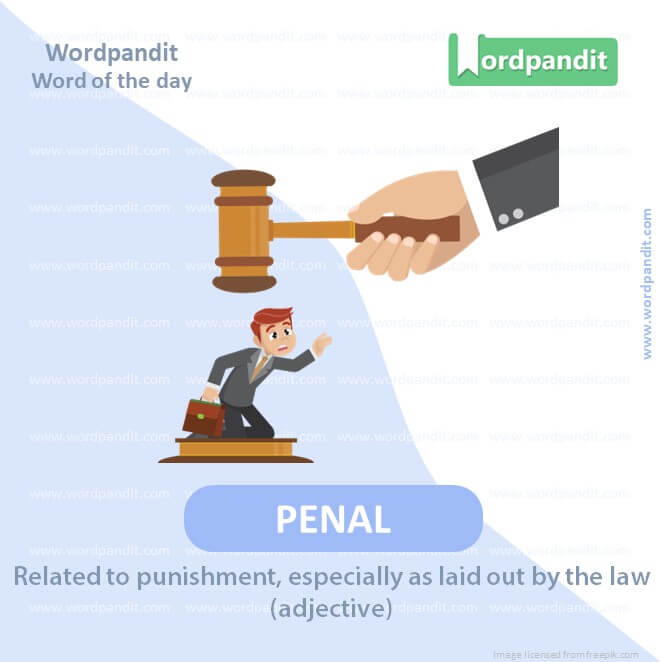
WORD-1: PENAL
CONTEXT: It is important that the offences in any penal law are clearly defined. Those who administer the law must know what offence has been committed so that arbitrary and discriminatory enforcement does not occur.
SOURCE: The Hindu
EXPLANATORY PARAGRAPH: Imagine you have rules in a game, and if someone breaks those rules, there’s a penalty, like missing a turn. The word “penal” is like that. It’s about punishments or things related to punishment.
MEANING: Related to punishment, especially as laid out by the law. (adjective)
PRONUNCIATION: PEE-null
SYNONYMS: punitive, disciplinary, corrective, chastening, retributive, penalizing, castigatory
USAGE EXAMPLES:
1. The penal system is designed to correct and rehabilitate offenders.
2. There are severe penal consequences for tax evasion.
3. The penal code outlines the laws of the country.
4. Some believe penal reforms are necessary for a fairer society.
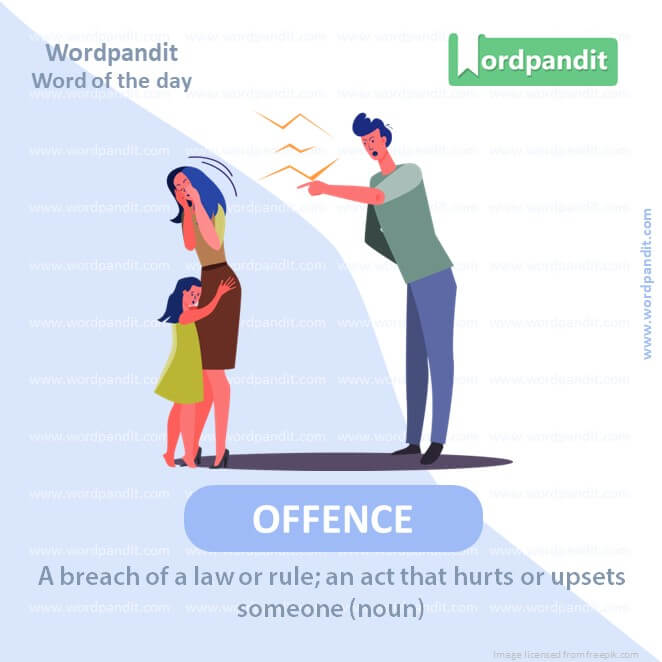
WORD-2: OFFENCE
CONTEXT: It is important that the offences in any penal law are clearly defined. Those who administer the law must know what offence has been committed so that arbitrary and discriminatory enforcement does not occur.
SOURCE: The Hindu
EXPLANATORY PARAGRAPH: Let’s think about soccer. When someone breaks a rule, like touching the ball with their hands, they commit an “offence.” Outside of games, “offence” can also mean doing something wrong or something that makes another person upset.
MEANING: A breach of a law or rule; an act that hurts or upsets someone. (noun)
PRONUNCIATION: uh-FENS
SYNONYMS: violation, wrongdoing, misdemeanor, transgression, indiscretion, lapse, breach
USAGE EXAMPLES:
1. He was taken to court for a traffic offence.
2. Making fun of someone’s appearance is a serious offence.
3. The company was fined for its environmental offences.
4. No offence intended, but I don’t like that shirt on you.
WORD-3: ARBITRARY
CONTEXT: It is important that the offences in any penal law are clearly defined. Those who administer the law must know what offence has been committed so that arbitrary and discriminatory enforcement does not occur.
SOURCE: The Hindu
EXPLANATORY PARAGRAPH: Think about picking a toy from a box without looking. You chose it randomly, without a specific reason. That’s like “arbitrary.” It means something is done or chosen without a clear reason.
MEANING: Based on random choice or personal whim, rather than logic. (adjective)
PRONUNCIATION: AR-bi-trair-ee
SYNONYMS: random, whimsical, capricious, chance, unpredictable, erratic, haphazard
USAGE EXAMPLES:
1. The teacher made an arbitrary decision to change the class schedule.
2. It seemed like an arbitrary rule with no clear purpose.
3. The selection process should not be arbitrary.
4. His reasoning seemed arbitrary to most people.
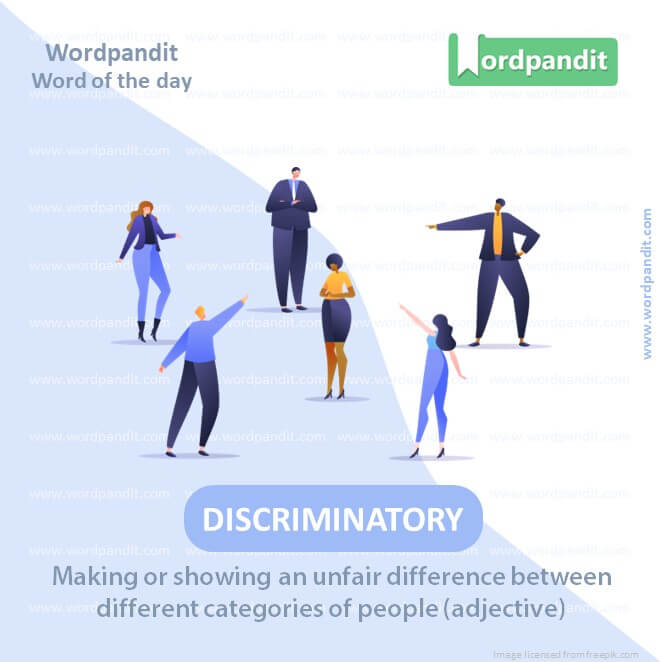
WORD-4: DISCRIMINATORY
CONTEXT: It is important that the offences in any penal law are clearly defined. Those who administer the law must know what offence has been committed so that arbitrary and discriminatory enforcement does not occur.
SOURCE: The Hindu
EXPLANATORY PARAGRAPH: Imagine if you had two types of candies and you only shared one type with your friends because of its color. That’s not fair, right? “Discriminatory” means treating someone unfairly based on things like their looks, beliefs, or background.
MEANING: Making or showing an unfair difference between different categories of people. (adjective)
PRONUNCIATION: dis-KRIM-in-a-tor-ee
SYNONYMS: biased, prejudiced, partial, unfair, one-sided, unequal, favoring
USAGE EXAMPLES:
1. The new policy was criticized for being discriminatory towards older employees.
2. Discriminatory practices have no place in modern society.
3. She faced discriminatory comments at her workplace.
4. The council is working to eliminate discriminatory barriers in the community.
WORD-5: GROSSLY
CONTEXT: In Shreya Singhal v. Union of India (2015), the Supreme Court held Section 66A of the Information Technology Act as unconstitutional. It found the term “grossly offensive” in the Section to be vague and devoid of precision.
SOURCE: The Hindu
EXPLANATORY PARAGRAPH: Imagine you’re describing a really, really big cake – way bigger than usual. You might say it’s “grossly” big. “Grossly” means something is extreme or way too much.
MEANING: In a very obvious and unacceptable manner; extremely. (adverb)
PRONUNCIATION: GROHSS-lee
SYNONYMS: extremely, highly, exceedingly, utterly, overly, profoundly, intensely
USAGE EXAMPLES:
1. The movie was grossly exaggerated compared to the real story.
2. She was grossly underpaid for the amount of work she did.
3. His actions were grossly inappropriate.
4. The project was grossly over budget.
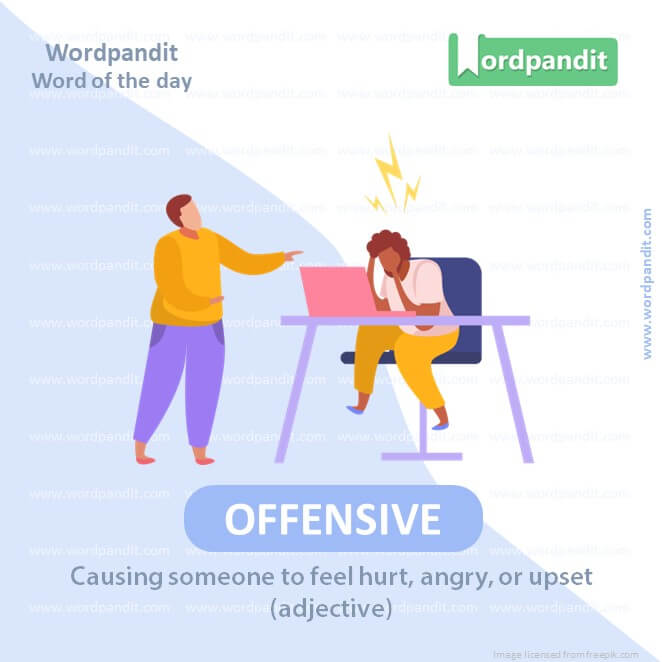
WORD-6: OFFENSIVE
CONTEXT: In Shreya Singhal v. Union of India (2015), the Supreme Court held Section 66A of the Information Technology Act as unconstitutional. It found the term “grossly offensive” in the Section to be vague and devoid of precision.
SOURCE: The Hindu
EXPLANATORY PARAGRAPH: Let’s say someone says something mean about your favorite toy. That would make you feel bad, right? The word “offensive” describes things or actions that can hurt or upset someone.
MEANING: Causing someone to feel hurt, angry, or upset. (adjective)
PRONUNCIATION: uh-FEN-siv
SYNONYMS: insulting, rude, derogatory, disrespectful, hurtful, belittling, demeaning
USAGE EXAMPLE:
1. The comedian made an offensive joke that upset many people.
2. Offensive language will not be tolerated in this classroom.
3. She found the advertisement offensive and wrote a complaint.
4. Some people find that kind of humor highly offensive.
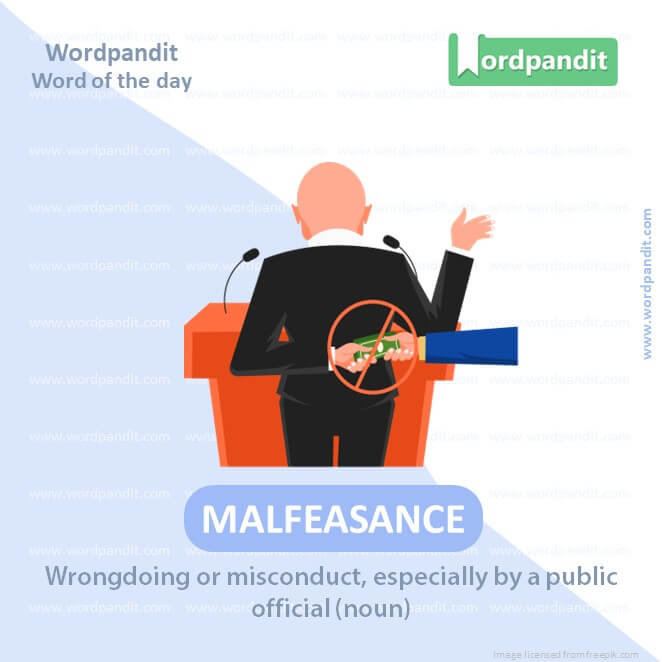
WORD-7: MALFEASANCE
CONTEXT: Sifting through allegations of corruption and malfeasance against politicians, especially those in the Opposition, after cases are filed by a successor-government in Indian States is a knotty exercise.
SOURCE: The Hindu
EXPLANATORY PARAGRAPH: Imagine if someone who is supposed to help and do good things, like a superhero, does something really bad instead. “Malfeasance” is a fancy word that means doing something wrong or bad, especially by someone in a position of trust.
MEANING: Wrongdoing or misconduct, especially by a public official (noun).
PRONUNCIATION: mal-FEE-zans
SYNONYMS: misconduct, misdeed, impropriety, wrongdoing, dishonesty, corruption
USAGE EXAMPLE:
1. The mayor was accused of malfeasance in office.
2. The company was investigated for financial malfeasance.
3. Evidence of malfeasance led to the official’s resignation.
4. The committee is dedicated to uncovering any act of malfeasance.
WORD-8: VAGUE
CONTEXT: In Shreya Singhal v. Union of India (2015), the Supreme Court held Section 66A of the Information Technology Act as unconstitutional. It found the term “grossly offensive” in the Section to be vague and devoid of precision.
SOURCE: The Hindu
EXPLANATORY PARAGRAPH: Think about a foggy day when you can’t see things clearly. If something is not clear or is hard to understand, we call it “vague.”
MEANING: Not clear in meaning or intention. (adjective)
PRONUNCIATION: vayg
SYNONYMS: unclear, ambiguous, nebulous, indistinct, hazy, uncertain, imprecise
USAGE EXAMPLE:
1. His instructions were so vague that no one knew what to do.
2. She had a vague memory of the place from her childhood.
3. The rules in the game were vague and confusing.
4. He gave a vague answer to avoid the question.
WORD-9: DEVOID
CONTEXT: In Shreya Singhal v. Union of India (2015), the Supreme Court held Section 66A of the Information Technology Act as unconstitutional. It found the term “grossly offensive” in the Section to be vague and devoid of precision.
SOURCE: The Hindu
EXPLANATORY PARAGRAPH: Imagine a cookie jar with no cookies in it. It’s empty, right? “Devoid” means something is completely missing or doesn’t have any of a particular thing.
MEANING: Completely lacking or free from. (adjective)
PRONUNCIATION: dih-VOID
SYNONYMS: lacking, without, bereft, empty of, void of, free from, destitute of
USAGE EXAMPLE:
1. The room was devoid of any furniture.
2. His voice was devoid of any emotion.
3. The landscape is almost devoid of trees.
4. The report is devoid of any real solutions.
WORD-10: PRECISION
CONTEXT: In Shreya Singhal v. Union of India (2015), the Supreme Court held Section 66A of the Information Technology Act as unconstitutional. It found the term “grossly offensive” in the Section to be vague and devoid of precision.
SOURCE: The Hindu
EXPLANATORY PARAGRAPH: Imagine trying to fit a small piece into a puzzle. You have to be very exact to make it fit perfectly. “Precision” means being very exact or accurate about something.
MEANING: The quality of being exact, accurate, and careful. (noun)
PRONUNCIATION: pree-SIZH-un
SYNONYMS: accuracy, exactness, preciseness, meticulousness, detail, correctness
USAGE EXAMPLE:
1. The experiment requires precision in measurements.
2. With the precision of a surgeon, she fixed the small device.
3. He is known for his precision in his work.
4. The machine cuts the material with high precision.







